- Home
- Ian Mcewan
On Chesil Beach Page 2
On Chesil Beach Read online
Page 2
“Here it comes,” she whispered as she squeezed his hand, warning him off another sudden intimacy. The waiters were arriving with their plates of beef, his piled twice the height of hers. They also brought sherry trifle and cheddar cheese and mint chocolates, which they arranged on a sideboard. After mumbling advice about the summoning bell by the fire-place—it must be pressed hard and held down—the lads withdrew, closing the door behind them with immense care. Then came a tinkling of the trolley retreating down the corridor, then, after a silence, a whoop or a hoot that could easily have come from the hotel bar downstairs, and at last, the newlyweds were properly alone.
A shift or a strengthening of the wind brought them the sound of waves breaking, like a distant shattering of glasses. The mist was lifting to reveal in part the contours of the low hills, curving away above the shoreline to the east. They could see a luminous gray smoothness that may have been the silky surface of the sea itself, or the lagoon, or the sky—it was difficult to tell. The altered breeze carried through the parted French windows an enticement, a salty scent of oxygen and open space that seemed at odds with the starched table linen, the cornflour-stiffened gravy, and the heavy polished silver they were taking in their hands. The wedding lunch had been huge and prolonged. They were not hungry. It was in theory open to them to abandon their plates, seize the wine bottle by the neck and run down to the shore and kick their shoes off and exult in their liberty. There was no one in the hotel who would have wanted to stop them. They were adults at last, on holiday, free to do as they chose. In just a few years’ time, that would be the kind of thing quite ordinary young people would do. But for now, the times held them. Even when Edward and Florence were alone, a thousand unacknowledged rules still applied. It was precisely because they were adults that they did not do childish things like walk away from a meal that others had taken pains to prepare. It was dinnertime, after all. And being childlike was not yet honorable, or in fashion.
Still, Edward was troubled by the call of the beach, and if he had known how to propose it, or justify it, he might have suggested going out straightaway. He had read aloud to Florence from a guidebook that said that thousands of years of pounding storms had sifted and graded the size of pebbles along the eighteen miles of beach, with the bigger stones at the eastern end. The legend was that local fishermen landing at night knew exactly where they were by the grade of shingle. Florence had suggested they might see for themselves by comparing handfuls gathered a mile apart. Trudging along the beach would have been better than sitting here. The ceiling, low enough already, appeared nearer to his head, and closing in. Rising from his plate, mingling with the sea breeze, was a clammy odor, like the breath of the family dog. Perhaps he was not quite as joyous as he kept telling himself he was. He felt a terrible pressure narrowing his thoughts, constraining his speech, and he was in acute physical discomfort—his trousers or underwear seemed to have shrunk.
So if a genie had appeared at their table to grant Edward’s most urgent request, he would not have asked for any beach in the world. All he wanted, all he could think of, was himself and Florence lying naked together on or in the bed next door, confronting at last that awesome experience that seemed as remote from daily life as a vision of religious ecstasy, or even death itself. The prospect—was it actually going to happen? to him?—once more sent cool fingers through his lower gut, and he caught himself in a momentary swooning motion which he concealed behind a contented sigh.
Like most young men of his time, or any time, without an easy manner, or means to sexual expression, he indulged constantly in what one enlightened authority was now calling “self-pleasuring.” Edward was pleased to discover the term. He was born too late in the century, in 1940, to believe that he was abusing his body, that his sight would be impaired, or that God watched on with stern incredulity as he bent daily to the task. Or even that everyone knew about it from his pale and inward look. All the same, a certain ill-defined disgrace hung over his efforts, a sense of failure and waste and, of course, loneliness. And pleasure was really an incidental benefit. The goal was release—from urgent, thought-confining desire for what could not be immediately had. How extraordinary it was, that a self-made spoonful, leaping clear of his body, should instantly free his mind to confront afresh Nelson’s decisiveness at Aboukir Bay.
Edward’s single most important contribution to the wedding arrangements was to refrain, for over a week. Not since he was twelve had he been so entirely chaste with himself. He wanted to be in top form for his bride. It was not easy, especially at night in bed, or in the mornings as he woke, or in the long afternoons, or in the hours before lunch, or after supper, during the hours before bed. Now here they were at last, married and alone. Why did he not rise from his roast, cover her in kisses and lead her toward the four-poster next door? It was not so simple. He had a fairly long history of engaging with Florence’s shyness. He had come to respect it, even revere it, mistaking it for a form of coyness, a conventional veil for a richly sexual nature. In all, part of the intricate depth of her personality, and proof of her quality. He persuaded himself that he preferred her this way. He did not spell it out for himself, but her reticence suited his own ignorance and lack of confidence; a more sensual and demanding woman, a wild woman, might have terrified him.
Their courtship had been a pavane, a stately unfolding, bound by protocols never agreed or voiced but generally observed. Nothing was ever discussed—nor did they feel the lack of intimate talk. These were matters beyond words, beyond definition. The language and practice of therapy, the currency of feelings diligently shared, mutually analyzed, were not yet in general circulation. While one heard of wealthier people going in for psychoanalysis, it was not yet customary to regard oneself in everyday terms as an enigma, as an exercise in narrative history, or as a problem waiting to be solved.
Between Edward and Florence, nothing happened quickly. Important advances, permissions wordlessly granted to extend what he was allowed to see or caress, were attained only gradually. The day in October he first saw her naked breasts long preceded the day he could touch them—December 19. He kissed them in February, though not her nipples, which he grazed with his lips once, in May. She allowed herself to advance across his own body with even greater caution. Sudden moves or radical suggestions on his part could undo months of good work. The evening in the cinema at a showing of A Taste of Honey when he took her hand and plunged it between his legs set the process back weeks. She became, not frosty, or even cool—that was never her way—but imperceptibly remote, perhaps disappointed, or even faintly betrayed. She retreated from him somehow without letting him ever feel in doubt about her love. Then at last they were back on course: when they were alone one Saturday afternoon in late March, with the rain falling heavily outside the windows of the disorderly sitting room of his parents’ tiny house in the Chiltern Hills, she let her hand rest briefly on, or near, his penis. For less than fifteen seconds, in rising hope and ecstasy, he felt her through two layers of fabric. As soon as she pulled away he knew he could bear it no more. He asked her to marry him.
He could not have known what it cost her to put a hand—it was the back of her hand—in such a place. She loved him, she wanted to please him, but she had to overcome considerable distaste. It was an honest attempt—she may have been clever, but she was without guile. She kept that hand in place for as long as she could, until she felt a stirring and hardening beneath the gray flannel of his trousers. She experienced a living thing, quite separate from her Edward—and she recoiled. Then he blurted out his proposal, and in the rush of emotion, the delight and hilarity and relief, the sudden embraces, she momentarily forgot her little shock. And he was so astonished by his own decisiveness, as well as mentally cramped by unresolved desire, that he could have had little idea of the contradiction she began to live with from that day on, the secret affair between disgust and joy.
They were alone then, and theoretically free to do whatever they wanted, but they went on
eating the dinner they had no appetite for. Florence set down her knife and reached for Edward’s hand and squeezed. From downstairs they heard the wireless, the chimes of Big Ben at the start of the ten o’clock news. Along this stretch of coast television reception was poor because of the hills just inland. The older guests would be down there in the sitting room, taking the measure of the world with their nightcaps—the hotel had a good selection of single malts—and some of the men would be filling their pipes for one last time that day. Gathering around the wireless for the main bulletin was a wartime habit they would never break. Edward and Florence heard the muffled headlines and caught the name of the prime minister, and then a minute or two later his familiar voice raised in a speech. Harold Macmillan had been addressing a conference in Washington about the arms race and the need for a test-ban treaty. Who could disagree that it was folly to go on testing H-bombs in the atmosphere and irradiating the whole planet? But no one under thirty—certainly not Edward and Florence—believed a British prime minister held much sway in global affairs. Every year the empire shrank as another few countries took their rightful independence. Now there was almost nothing left, and the world belonged to the Americans and the Russians. Britain, England, was a minor power—saying this gave a certain blasphemous pleasure. Downstairs, of course, they took a different view. Anyone over forty would have fought or suffered in the war and known death on an unusual scale, and would not have been able to believe that a drift into irrelevance was the reward for all the sacrifice.
Edward and Florence would be voting for the first time in the next general election and were keen on the idea of a Labour landslide as great as the famous victory of 1945. In a year or two, the older generation that still dreamed of empire must surely give way to politicians like Gaitskell, Wilson, Crosland—new men with a vision of a modern country where there was equality and things actually got done. If America could have an exuberant and handsome President Kennedy, then Britain could have something similar—at least in spirit, for there was no one quite so glamorous in the Labour Party. The Blimps, still fighting the last war, still nostalgic for its discipline and privations—their time was up. Edward and Florence’s shared sense that one day soon the country would be transformed for the better, that youthful energies were pushing to escape, like steam under pressure, merged with the excitement of their own adventure together. The sixties was their first decade of adult life, and it surely belonged to them. The pipe smokers downstairs in their silver-buttoned blazers, with their double measures of Caol Ila and memories of campaigns in North Africa and Normandy and their cultivated remnants of army slang—they could have no claim on the future. Time, gentlemen, please!
The rising mist continued to unveil the nearby trees, the bare green cliffs behind the lagoon and portions of a silver sea, and the smooth evening air poured in around the table, and they continued their pretense of eating, trapped in the moment by private anxieties. Florence was merely moving the food around her plate. Edward ate only token morsels of potato, which he carved with the edge of his fork. They listened helplessly to the second item of news, aware of how dull it was of them to be linking their attention to that of the guests downstairs. Their wedding night, and they had nothing to say. The indistinct words rose from under their feet, but they made out “Berlin” and knew instantly that this was the story that lately had captivated everyone. It was an escape from the Communist east to the west of the city by way of a commandeered steamship on the Wannsee, the refugees cowering by the wheelhouse to dodge the bullets of the East German guards. They listened to that, and now, intolerably, the third item, the concluding session of an Islamic conference in Baghdad.
Bound to world events by their own stupidity! It could not go on. It was time to act. Edward loosened his tie and firmly set down his knife and fork in parallel on his plate.
“We could go downstairs and listen properly.”
He hoped he was being humorous, directing his sarcasm against them both, but his words emerged with surprising ferocity, and Florence blushed. She thought he was criticizing her for preferring the wireless to him, and before he could soften or lighten his remark she said hurriedly, “Or we could go and lie on the bed,” and nervously swiped an invisible hair from her forehead. To demonstrate how wrong he was, she was proposing what she knew he most wanted and she dreaded. She really would have been happier, or less unhappy, to go down to the lounge and pass the time in quiet conversation with the matrons on the floral-patterned sofas while their men leaned seriously into the news, into the gale of history. Anything but this.
Her husband was smiling and standing and ceremoniously extending his hand across the table. He too was a little pink about the face. His napkin clung to his waist for a moment, hanging absurdly, like a loincloth, and then wafted to the floor in slow motion. There was nothing she could do, beyond fainting, and she was hopeless at acting. She stood and took his hand, certain that her own returning smile was rigidly unconvincing. It would not have helped her to know that Edward in his dreamlike state had never seen her looking lovelier. Something about her arms, he remembered thinking later, slender and vulnerable, and soon to be looped adoringly around his neck. And her beautiful light brown eyes, bright with undeniable passion, and the faint trembling in her lower lip, which even now she wetted with her tongue.
With his free hand he tried to gather up the wine bottle and the half-full glasses, but that was too difficult and distracting—the glasses bulged against each other, causing the stems to cross in his hands and the wine to spill. Instead he seized the bottle alone by the neck. Even in his exalted, jittery condition he thought he understood her customary reticence. All the more cause for joy then, that they faced this momentous occasion, this dividing line of experience, together. And the thrilling fact remained that it was Florence who had suggested lying on the bed. Her changed status had set her free. Still holding her hand, he came around the table and drew near to kiss her. Believing it was vulgar to do so holding a wine bottle, he set it down again.
“You’re very beautiful,” he whispered.
She made herself remember how much she loved this man. He was kind, sensitive, he loved her and could do her no harm. She shrugged herself deeper into his embrace, close against his chest, and inhaled his familiar scent, which had a woody quality and was reassuring.
“I’m so happy here with you.”
“I’m so happy too,” she said quietly.
When they kissed she immediately felt his tongue, tensed and strong, pushing past her teeth, like some bully shouldering his way into a room. Entering her. Her own tongue folded and recoiled in automatic distaste, making even more space for Edward. He knew well enough she did not like this kind of kissing, and he had never before been so assertive. With his lips clamped firmly onto hers, he probed the fleshy floor of her mouth, then moved around inside the teeth of her lower jaw to the empty place where three years ago a wisdom tooth had crookedly grown until removed under general anesthesia. This cavity was where her own tongue usually strayed when she was lost in thought. By association, it was more like an idea than a location, a private, imaginary place rather than a hollow in her gum, and it seemed peculiar to her that another tongue should be able to go there too. It was the hard tapering tip of this alien muscle, quiveringly alive, that repelled her. His left hand was pressed flat above her shoulder blades, just below her neck, levering her head against his. Her claustrophobia and breathlessness grew even as she became more determined that she could not bear to offend him. He was under her tongue, pushing it up against the roof of her mouth, then on top, pushing down, then sliding smoothly along the sides and around, as though he thought he could tie a simple up-and-over knot. He wanted to engage her tongue in some activity of its own, coax it into a hideous mute duet, but she could only shrink and concentrate on not struggling, not gagging, not panicking. If she was sick into his mouth, was one wild thought, their marriage would be instantly over, and she would have to go home and explain herself to her par
ents. She understood perfectly that this business with tongues, this penetration, was a small-scale enactment, a ritual tableau vivant, of what was still to come, like a prologue before an old play that tells you everything that must happen.
As she stood waiting for this particular moment to pass, her hands for form’s sake resting on Edward’s hips, Florence realized she had stumbled across an empty truth, self-evident enough in retrospect, as primal and ancient as danegeld or droit du seigneur and almost too elemental to define. In deciding to be married, she had agreed to exactly this. She had agreed it was right to do this and have this done to her. When she and Edward and their parents had filed back to the gloomy sacristy after the ceremony to sign the register, it was this they had put their names to, and all the rest—the supposed maturity, the confetti and cake—was a polite distraction. And if she didn’t like it, she alone was responsible, for all her choices over the past year were always narrowing to this, and it was all her fault, and now she really did think she was going to be sick.

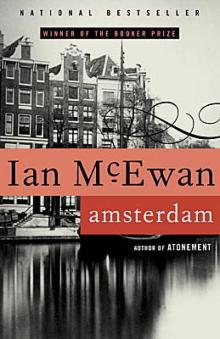 Amsterdam
Amsterdam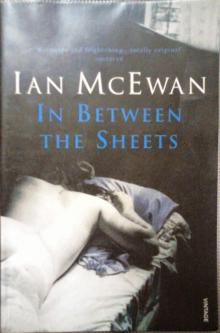 In Between the Sheets
In Between the Sheets Atonement
Atonement My Purple Scented Novel
My Purple Scented Novel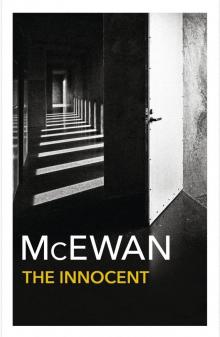 The Innocent
The Innocent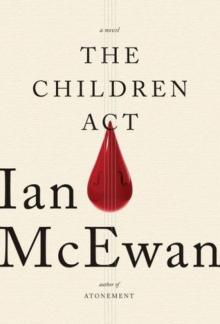 The Children Act
The Children Act Enduring Love
Enduring Love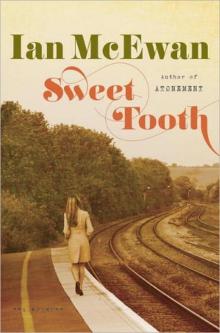 Sweet Tooth
Sweet Tooth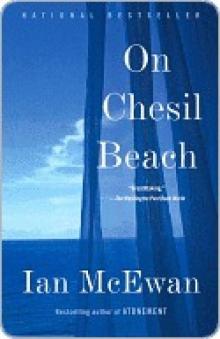 On Chesil Beach
On Chesil Beach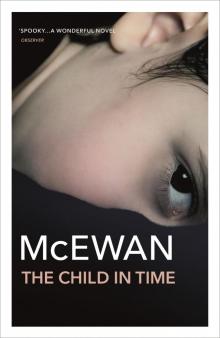 The Child in Time
The Child in Time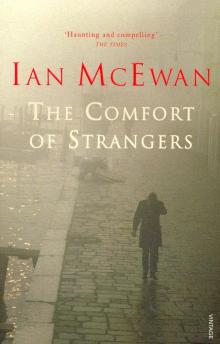 The Comfort of Strangers
The Comfort of Strangers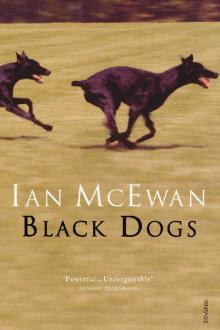 Black Dogs
Black Dogs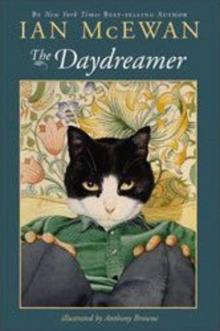 The Daydreamer
The Daydreamer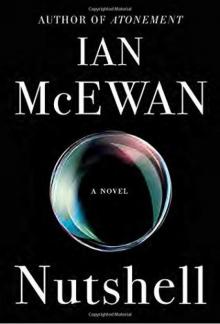 Nutshell
Nutshell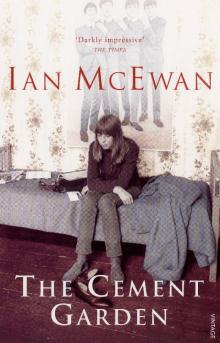 The Cement Garden
The Cement Garden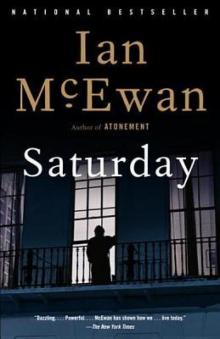 Saturday
Saturday Machines Like Me
Machines Like Me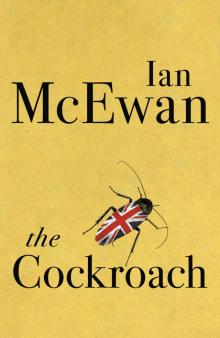 The Cockroach
The Cockroach The Ploughman’s Lunch
The Ploughman’s Lunch